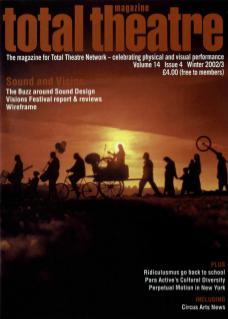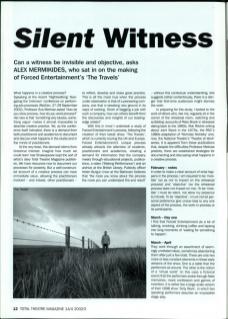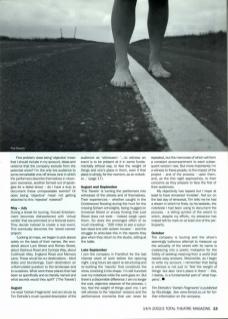What happens in a creative process? Speaking at the recent 'Nightwalking: Navigating the Unknown' conference on performing arts processes (ResСen, 27-29 September 2002), Professor Sue Melrose asked 'How do you show process, how do you word process?' Her view is that 'something very elusive, something vague' makes it almost impossible to describe creative practice. Yet, as the conference itself indicated, there is a demand from both practitioners and academics to document and discuss what happens in the studio and in the minds of practitioners.
At the very least, this demand stems from historical interest: imagine how much we could learn had Shakespeare kept the sort of artist's diary Total Theatre Magazine publishes. We have resources now to document our processes for posterity. But a well-constructed account of a creative process can have immediate value, allowing the practitioners involved – and indeed, other practitioners – to reflect, develop and share good practice. This is all the more true when the process under observation is that of a pioneering company, one that is breaking new ground in its ways of working. Short of bagging a job with such a company, how can others benefit from the discoveries and insights of our leading-edge artists?
With this in mind I undertook a study of Forced Entertainment's process, following the creation of their latest show, The Travels, which is currently touring the UK and Europe. Forced Entertainment's unique process already attracts the attention of students, practitioners and academics, creating a demand for information that the company meets through educational projects, publications, a video (Making Performance) and an archive at the British Library. Publicity officer Helen Burgun (now at the Barbican) believes that the more you know about the process the more you can understand the end result – without this contextual understanding, she suggests rather contentiously, there is a danger that first-time audiences might dismiss the work.
In preparing for this study, I looked to the work of others who, like me, regularly sit in the corner of the rehearsal room, watching and scribbling: accounts of Peter Brook in rehearsal dating back to the 1960s, Rob Ritchie writing about Joint Stock in the 1970s, the RSC's 1980s adaptation of Nicholas Nickleby and, now, the National Theatre's Theatre at Work series. It is apparent from these publications that, despite the difficulties Professor Melrose predicts, there are established strategies for documenting and discussing what happens in a creative process.
February – notes
In order to make a clear account of what happens in the process, I am required to be ‘invisible' (so as not to impact on the rehearsal process) and 'objective' (so the rehearsal process does not impact on me). To be 'invisible' I must be silent, not allow my presence to intrude. To be 'objective’, I must not let personal preference give undue bias to any one aspect of the process, the work-in-process or its participants.
March – Day one
I find that Forced Entertainment do a lot of talking, smoking, drinking coffee and lapsing into long moments of ‘waiting for something to happen'.
March-April
They work through an assortment of seemingly unrelated ideas, sometimes abandoning them after just a few trials. There are only two more or less constant elements in these early versions of the show. One is a table that the performers sit around. The other is the notion of a ‘virtual world' (in this case a fictional event) that the performers evoke through false memories, mock confession and games of invention. It is rather like a large-scale version of their 1998 show Dirty Work, in which two speaking performers describe an impossible stage play.
First problem: does being 'objective' mean that I should include in my account, ideas and versions that the company exclude from the potential show? I'm the only live audience to some remarkable one-off shows (one in which the performers describe themselves in clown-porn scenarios, another formed out of apologies for a failed show) – do I have a duty to document these unrepeatable events? Or does being ‘objective' mean not getting attached to this ‘rejected’ material?
May-July
During a break for touring, Forced Entertainment becomes disheartened with ‘virtual worlds' that are premised on a fictional event. They decide instead to create a real event. This eventually becomes the ‘street-names' project:
'Looking at maps, we began to pick places solely on the basis of their names. We wondered about Luck Street and Riches Street, about Orpheus Road and Cyclops Way, about Cutthroat Alley, England Road and Memory Lane. These would be our destinations – blind stabs and blunderings. Each destination an unformulated question to the landscape and to ourselves. What were these places that had been so specifically and so literally named and what secrets would they spill?' (The Travels)
August
I re-read Certain Fragments and am struck by Tim Etchells' much-quoted description of the audience as 'witnesses': ‘...to witness an event is to be present at it in some fundamentally ethical way, to feel the weight of things and one's place in them, even if that place is simply, for the moment, as an onlooker...’ (page 17).
August and September
The Travels is turning the performers into witnesses of the streets and of themselves. Their experiences – whether caught in the Cricklewood flooding during the hunt for the missing Soham school girls, being mugged on Universal Street, or simply finding that Lost Wood does not exist – indeed weigh upon them. So does the prolonged effort of so much travelling – ‘200 miles to see a suburban dead end with sixteen houses' – and the struggle to articulate this in the reports they give when they return to the studio, sitting at the table.
Late September
I join the company in Frankfurt for the last intense week of work before the opening night. Long hours are spent restructuring and reworking the reports that constitute the show, knocking it into shape. I'm still hunched over my notebook while the work goes on. But there's a discernible difference: I am no longer the cool, objective observer of the process. I too, feel the weight of things upon me. I am still witness to the ‘rejected' versions and the performance moments that can never be repeated, but the memories of which will form a constant accompaniment to each subsequent version I see. But more importantly I'm a witness to these people, to the impact of the project – and of the process – upon them, and, as the first night approaches, to their concerns as they prepare to face the first of their audiences.
My objectivity has lapsed but I hope at least to have remained ‘invisible'. Not so: on the last day of rehearsal, Tim tells me he had a dream in which he finds, by his bedside, the notebook I had been using to document the process – a telling symbol of the extent to which, despite my efforts, my presence has indeed left its mark on at least one of the participants.
October
The company is touring and the show's seemingly ludicrous attempt to measure up the actuality of the street with its name is coalescing into a poetic metaphor for the futility of seeking meaning from a world that resists easy answers. Meanwhile, as I begin to write my account, I remember that being a witness is not just to ‘feel the weight of things' but also 'one's place in them' – this, I realise, is a fundamental part of ‘what happens'.
Tim Etchells' Certain Fragments is published by Routledge. See www.forced.co.uk for further information on the company.


